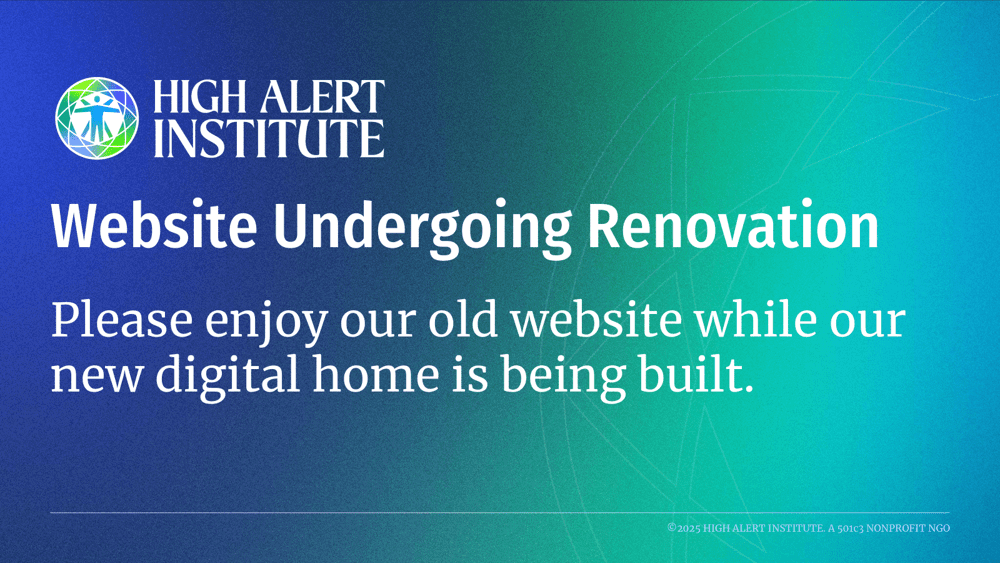High Alert Institute
Emotional Intelligence: Building a Better, Stronger You

The newest catch phrase in human resource management and career development, it is “emotional intelligence”. Commonly defined as the insight into ones own reaction to the work place environment as well as the people and events in that environment emotional intelligence is quickly becoming the newest way to say “be nice or leave”.
Fortunately, emotional intelligence encompasses far more than what most corporations realize. Emotional intelligence has the ability, when properly applied, to provide not only great insight into ourselves but into our customers and our coworkers. It is in fact, the key to greater success.
Emotional intelligence requires the same three step process as Instadecision (instinctual or instantaneous decision making):
- Pattern recognition
- Acknowledging framing bias
- Heuristic Analysis
While pattern recognition and acknowledgement of the framing bias are the same in emotional intelligence as they are in any Instadecision process, the final step, heuristic analysis, is significantly different. In a standard Instadecision process, heuristic analysis involves the exploration of oneself as a microcosm of the market or group of people being analyzed. This is incredibly difficult when you yourself are the “group of people” being analyzed.
While it is difficult to walk a mile in some else’s moccasins and thus learn about them as the old adage would suggest, it is impossible to walk in one’s own moccasins as an observer while walking in one’s own moccasins as the observed and glean any meaningful information. Or is it?
Bill Gates is credited with telling a high school graduating class that they should “find themselves” on their own time because it is not the job of an employer to pay them while they find themselves. Yet, the process of emotional intelligence demands just that, a deep understanding of what we do, why we do it and what is the emotional benefit that we gain from that action. Those who are parents know that every often, a child, even a teenager and the occasional college student will misbehave in order to gain parental attention even when that attention is negative. This behavior does not stop just because we enter the workforce. It is not unusual for someone to behave in a socially or even corporately unacceptable fashion simply to gain attention, however negative, from coworkers or even the boss.
It is the insight on the individual employee’s part into the motivations for their actions that makes emotional intelligence both valuable and powerful as a human resource application of the Instadecision process. It also lends to the individual employee’s and the organization’s “canteens” of resilience.
Seven “Canteens” of Resilience:
Physical resilience is exactly as the name implies—it is the physical capacity to continue working in light of physical and even emotional stress. We enhance our physical resilience by maintaining our health and living a healthy lifestyle. Eating a balanced diet, both at home and at work; regular exercise; and adequate rest are essential to “filling” your canteen of physical resilience and maintaining balance.
Emotional resilience deals directly with what we feel and how we respond to it. The old saying “attitude counts” is never more true than when filling your canteen of emotional resilience. Loving and being loved, including loving yourself, recognizing the everyday joys of life, and ensuring that you have the opportunity for boundless joy and genuine happiness, fill your canteen with the sweet emotions that counterbalance the many unpleasant and at times even horrific scenes we all encounter when responding to disaster. On the other hand, if you have filled your emotional canteen with despair, selfloathing, angst and animus, then you will have nothing but bitter drags from which to drink when in the midst of stress or crisis.
Intellectual resilience is bolstered by the very act of learning. As we gain experience and knowledge, we slowly imprint new patterns that we may later use to compare and ultimately recognize as familiar situations and events that unfold during a disaster. The more of these patterns that we have in our intellectual canteen, the more quickly we can recognize and adapt to the ever-changing environment, thus bolstering our intellectual resilience.
Interpersonal resilience is bolstered through our relationships with those we hold dear: spouses and significant others; children and grandchildren; parents; relatives; friends; and co-workers. We fill our canteen of interpersonal resilience with memories and comforting mental images that carry us through our times of separation. These relationships also safeguard our lives and our emotions. Through these relationships we not only fill our canteens, but we also keep watch on each other.
Societal resilience comes from the ties that bind us to our neighbors and our communities. The old saying “no man is an island” does not only apply to relationships, but also to the place we each hold in a greater society. Large scale disasters test the cohesiveness of communities, while the small personal disasters test the metal of society. Our willingness to be responsible for not only ourselves but also a greater common good fills our canteens of societal resilience as we serve others in concert with like-minded people.
Tactical resilience grows through the application skills we have practiced in our day-to-day lives as we have moved through our careers and are that with which we fill our canteen of functional resilience. Like the patterns in our canteen of intellectual resilience, the skills of our tactical resilience are no different at times of stress and crisis than they are in the “good times.” We need only be able to access those skills more quickly and perform them more calmly.
Spiritual resilience is somewhat different because the canteen of spiritual resilience is not filled by what we believe, but rather by the fact that we do believe. Research in the area of resilience has shown that the very act of believing in an intelligence beyond ourselves, a higher purpose or higher power, bolsters our resilience, improves our function and increases our likelihood to master adversity.
Emotional intelligence is full dependant upon these seven canteens of resilience because emotional intelligence requires the ability to adapt and change. The ability to adapt and change requires that we have sufficient resilience to sustain our psyche and self esteem through the self exploration and change.
Emotional Intelligence and the Corporation:
The application of emotional intelligence within a corporation carries with it responsibilities for the corporation itself. The corporation that institutes policies governed by principles of emotional intelligence essentially takes on the responsibility of guiding and nurturing employees to discover an modify not the behaviors that are corporately unacceptable but the means by which they gain the emotional satisfaction that causes them to take these actions. Just as the parent of the child who misbehaved in order to obtain parental attention can only modify that behavior by providing parental attention as the reward for good behavior, corporations in the persons of their owners, leaders, managers, and supervisors must assist employees, under an emotional intelligence model, to seek positive reinforcement for positive action rather than negative reinforcement for negative actions.
This is not to say that an employee should be treated as a child, or that the employee is acting as a child, or that a corporation should take on the role of a parent or surrogate parent. Quite to the contrary, in an emotional intelligence model, the corporation becomes a partner with the employee in the employee’s career advancement and the employee becomes a partner with the corporation in greater corporate success.
The insight gained by everyone in an emotional intelligence model is also translated to the employee’s home, family, in personal life. By learning the action/reward system (pattern recognition) that governs their own automatic actions each individual takes ownership of their decision making process and thereby of their actions, interactions, and the outcome of all of the above. Emotional intelligence holds the promise of greatly enriching the lives and the livelihoods of every member of an organization whether it is a corporation, small business, the community, a family, or whether it is the individual themselves.
High Alert Institute
4800 Ben Hill Trail
Lake Wales, FL 33898
Office: 863.696.8090
FAX: 407.434.0804
EIN: 27-5078437
Info@HighAlertInstitute.org
Privacy Policy
Cookie Policy
Terms of Use
Disclaimers
Get Your Data
Shipping Policy
Message Us
Transparency
Registrations
Do Not Sell Info
Return Policy
A COPY OF THE OFFICIAL REGISTRATION AND FINANCIAL INFORMATION MAY BE OBTAINED FROM THE DIVISION OF CONSUMER SERVICES BY CALLING TOLL-FREE, WITHIN THE STATE, 1-800-435-7352 (800-HELP-FLA), OR VISITING www.FloridaConsumerHelp.com. REGISTRATION DOES NOT IMPLY ENDORSEMENT, APPROVAL, OR RECOMMENDATION BY THE STATE. Florida Registration #CH68959
REGISTRATION WITH A STATE AGENCY DOES NOT CONSTITUTE OR IMPLY ENDORSEMENT, APPROVAL OR RECOMMENDATION BY THAT STATE.










